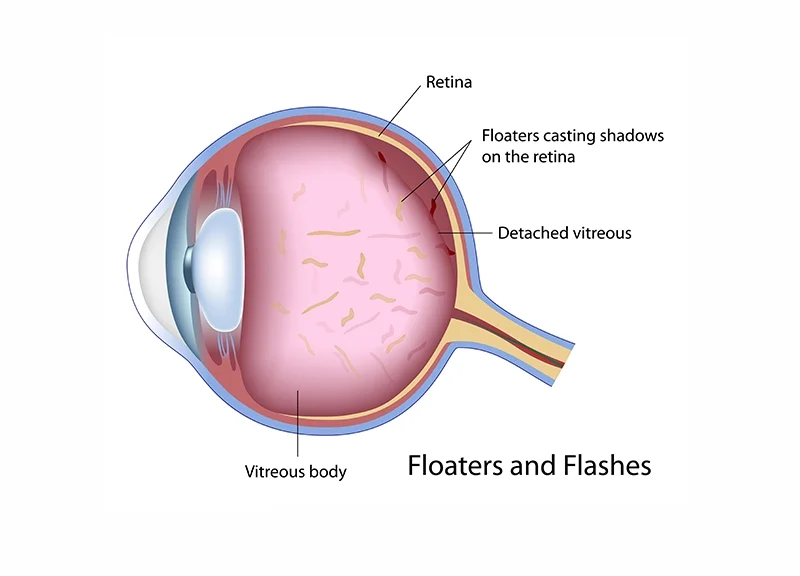Visual flashes and floaters are common disturbances, and in most cases they are not harmful. However, people who experience flashes or floaters should be evaluated by an eye doctor, since these visual disturbances are sometimes symptoms of
Trusted Source
Flashes and Floaters in Your Eyes: When to See the Doctor
Cleveland Clinic
Go to Source
more serious conditions
. At Retina Specialty Institute, our experienced ophthalmologists can diagnose the source of flashes and floaters and recommend proper treatment. We proudly serve patients from Alabama, Florida, Mississippi, and the entire Gulf Coast.

What Causes Flashes?
Visual flashes are rapid streaks or bursts or light in the visual field. It is normal to experience flashes when you close your eyes or when your eyes quickly shift vision. Flashes are a result of the vitreous (the jelly-like substance in the middle of the eye) pulls away from the retina. Flashes are part of the eye’s aging process for most people. Flashes may also be noticed at the onset of a migraine headache.

What Causes Floaters?
Floaters are dark dots, specks, or strands in the visual field. You may experience floaters when you look at solid colors in bright light, such as viewing objects in a bright sky or on a white wall. Floaters are a result of collagen fiber clumps in the vitreous. Floaters are only a cause for concern if they develop suddenly or interfere with your vision.
How are Flashes and Floaters Diagnosed?
If you see flashes and/or floaters frequently, you should discuss it with your eye doctor at your next exam. If, however, you see a sudden increase in flashes and floaters, you should see an ophthalmologist as soon as possible. Your eye doctor can perform a dilated eye exam to examine your retina.
Treatment for Flashes and Floaters
Only in rare cases do flashes and floaters require treatment. Treatment is necessary, however, if flashes and floaters are found to be caused by a more serious eye condition. In such cases, treatment may involve an in-office laser procedure or a vitrectomy, a
Trusted Source
Vitrectomy
National Eye Institute
Go to Source
microsurgical procedure
where the eye’s vitreous gel is removed and replaced.

Conditions Related to Flashes and Floaters
In the vast majority of cases, flashes and floaters are nothing more than visual annoyances. While flashes and floaters are common on their own, they become a concern when they occur suddenly and at the same time. In such cases, flashes and floaters may be caused by a more serious condition, such as:
- Retinal detachment or retinal tear
- Hemorrhage
- Retinitis
- Infection
- Ocular tumor
- Eye injury
Posterior Vitreous Detachment (PVD)
Posterior vitreous detachment is not a vision-threatening condition, and no treatment is necessary. In most cases, people don’t even notice a PVD, but in some cases they experience flashes and/or floaters. While posterior vitreous detachment is not in itself a threat to vision, in a small number of people it can cause a retinal hemorrhage or tear.
Trusted Source
What is posterior vitreous detachment?
American Academy of Ophthalmology
Go to Source
This could result in retinal detachment
, a serious condition that necessitates immediate treatment. Due to the risk of retinal detachment from PVD, if you experience sudden flashes or floaters you should have your eyes examined as soon as possible.

Contact Retina Specialty Institute
If you are concerned by a sudden increase in flashes and floaters, you should have your eyes examined by an ophthalmologist you can trust. The experts at Retina Specialty Institute are focused on the diagnosis and treatment of retina conditions.
1 Cleveland Clinic. Flashes and Floaters in Your Eyes: When to See the Doctor. Available: https://health.clevelandclinic.org/flashes-and-floaters-in-your-eyes-when-to-see-the-doctor/ Accessed August 3, 2022.
2 American Academy of Ophthalmology. What is posterior vitreous detachment? Available: https://www.aao.org/eye-health/diseases/what-is-posterior-vitreous-detachment/. Accessed August 3, 2022.
3 National Eye Institute. Vitrectomy. Available: https://www.nei.nih.gov/learn-about-eye-health/eye-conditions-and-diseases/retinal-detachment/vitrectomy. Accessed August 3, 2022.
The doctors at Retina Specialty Institute have either authored or reviewed and approved this content.
Page Updated:







